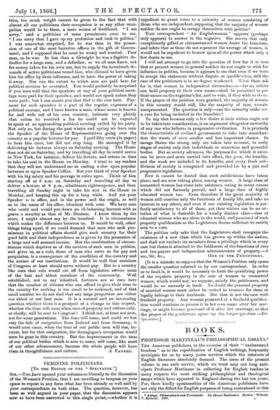FEMININE POLITICIANS.
[To THE EDITOR OF THE "SPECTATOR."] Sin, —You Jiave opened your columns so liberally to the discussion of the Women's Petition, that I am unwilling to trespass on your space to repeat in any form what has been already so well said by your correspondents on both sides. The question, however, has been so well argued in your paper, that the discussion appears now to have been narrowed to this single point,—whether it is
expedient to grant votes to a minority of women consisting of theee who are independent, supposing that the majority of women neither do nor ought to occupy themselves with politics?
Your correspondent "An Englishwoman" appears (perhaps only appears) to answer in the negative. She asserts that only exceptionally gifted or circumstanced women desire the franchise, and infers that as these do not represent the average of women, it would not be expedient to bestow upon all the power which only a few desire to use.
I will not attempt to go into the question of how far it is true that at present women in general neither do nor ought to wish for influence in politics, because it appears to me that even if we were to accept the statement without dispute or qualification, still the case of the petitioners is in no degree weakened. What these ask for is, that women in independent circumstances—for no others can hold property in their own name—shall be permitted to put their names on the registrar's list, and to vote, if they wish to do so. If the prayer of the petition were granted, the majority of women in this country would still, like the majority of men, remain unrepresented. The question is only—can the minority make out a case for being included in the franchise?
To say that because only a few desire it their wishes ought not to be taken into consideration, is an argument altogether unworthy of any one who believes in progressive civilization. It is precisely the characteristic of civilized government to take into considera- tion the wants of even smaller and less important classes. In savage States the strong only are taken into account, in early stages of society only rich individuals or numerous and powerful bodies. But as society advances, the purposes for which it exists can be more and more carried into effect, the poor, the humble, and the weak are included in its benefits, and every fresh sub- division of society is recognized and provided for by a just and progressive legislation.
Now it cannot be denied that such subdivisions have taken place, and are now taking place, among women.. A large class of unmarried women has come into existence, owing to many causes which did not formerly prevail, and a large clans of highly educated women too. Even therefore if the great majority of women still exercise only the functions of family life, and take no interest in any others, and even if our existing legislation is per- fectly satisfactory to all of these, yet their wishes can be no cri- terion of what is desirable for a totally distinct class—that of educated women who are alone in the world, and possessed of such property qualification as the Legislature deems sufficient to entitle men to a vote.
The petition only asks that the Legislature shall recognize the existence of a new class which has grown up within the nation, and shall not exclude its members from a privilege which in every case but theirs is attached to the fulfilment of the functions of rate and tax-payers and independent administrators of property.—I
[It is a mistake to suppose that the Women's Petition only opens the smaller question referred to by our correspondent. In order so to limit it, it would be necessary to limit the qualifying power of the requisite property in the case of women to unmarried women, which would not, we suppose, satisfy the petitioners, and would be an anomaly in itself. No doubt the personal property of married women must either be vested in trustees for them or legally belongs to their husbands. But that is not the case with freehold property. Any woman possessed of a freehold qualifica- tion would continue to possess it iu her own name after her mar- riage, or might become possessed of it after her marriage, so that the prayer of the petitioners opens up the larger question. —En. Spectator.]






























 Previous page
Previous page